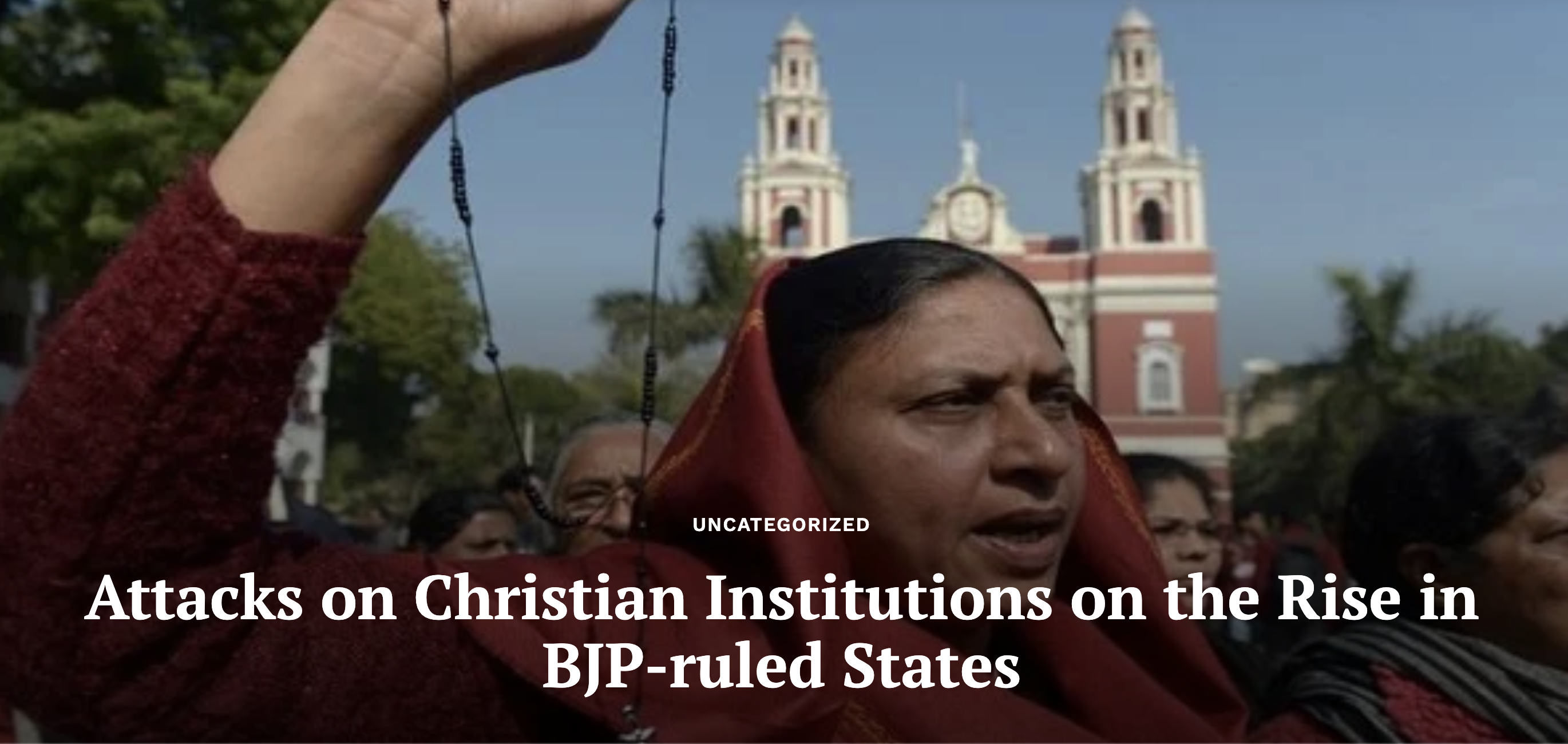
Team Clarion
NEW DELHI – Hindutva elements have increased attacks on Christian institutions in several states governed by the Bharatiya Janata Party (BJP) since the saffron party assumed power for the third consecutive time in June this year.
According to the United Christian Forum, an ecumenical persecution watchdog, there were 361 registered incidents of attacks on Christians in the country up to June this year, with fears these have escalated since the BJP’s election victory.
The Church runs more than 50,000 educational institutions, including schools and 400 colleges, six universities and six medical schools in the country.
Several Christian schools and orphanages in Madhya Pradesh have recently been subjected to raids by federal and state child rights panels and cases were registered against church figures, including a bishop, priests, and nuns under the state’s stringent anti-conversion law.
On July 22, officials registered a case against Vandana Convent School in the state’s Guna district for its insistence on recitation of prayers in English, which they claimed was “hurting the religious sentiments” of pupils.
“Ours is an English medium school. But a case has been registered against us for following the medium of instruction that is English in our 50-year-old school,” said Vice Principal, Sr Rashmi Kuzhyil. The day-cum-boarding school is affiliated with CBSE and was established in 1974.
The school management and its principal Sr Catherine Vattoly were named in a complaint filed by the students wing of the BJP, the Akhil Bharatiya Vidyarthi Parishad (ABVP).
Nearly 50 ABVP activists broke into the school and raised slogans against the principal and management, calling for Vattoly’s dismissal for “hurting” religious sentiments.
A week later, ABVP activists led a raid on St Peter Higher Secondary School in Indore, part of the Diocese of Jhabua. Activists entered the school with portraits of Saraswati, the Hindu goddess of learning, demanding that they replace the school’s statues of St Peter and the Virgin Mary. They installed the portraits on the walls and warned the management against removing them.
These attacks followed a series of official and vigilante measures against Christian schools earlier this year.
The Madhya Pradesh government has charged three Christian schools with charging exorbitant fees, as part of what officials said was a state-wide action that also charged eight other non-Christian schools.
In the BJP-governed northeastern state of Assam, Hindutva groups have demanded the removal of religious symbols from Christian schools and restrictions on religious expression on the grounds that this breaches anti-conversion legislation.
A message in February from a self-styled Hindu family protection council threatened Christian schools with dire consequences if they failed to remove photographs, portraits, or statues of Jesus and Mary from school premises within 15 days.
A 60-year-old Carmel school in Jorhat in Assam sought police protection after a threatening poster was found pasted on its wall. The principal Sr Rose Fatima said in her complaint that the poster has created panic.
Hindutva groups ordered Catholic priests, nuns and religious brothers to stop wearing cassocks and habits in schools. In response, Archbishop John Moolachira of Guwahati, Assam’s capital, asked all educational institutes in his diocese to lodge complaints with the state government.
In Tripura, Bajrang Dal activists accused a Christian school of discriminating against Hindu practices. As in many states, the activists claimed they were protecting members of tribal and other vulnerable groups from forced conversion.
Southern states have seen similar attacks. In Telangana, activists vandalised a school and attacked a priest after he questioned why pupils were wearing Hindu religious dress rather than uniforms.
A group dressed in saffron shirts and shawls chanting ‘Jai Shri Ram’ broke into the St Mother Teresa English Medium School in the Mancherial district on 16 April, breaking windows and flower pots and vandalising the statue of St Teresa of Calcutta at the school gate.
They attacked the school’s manager Fr Jaimon Joseph, who had called the parents of pupils who had come to the school not wearing uniform. Pupils had claimed their dress was part of a 21-day ritual and accused him of hurting religious sentiments.
Fr Joseph said a large crowd had gathered after the initial attack to damage the school. He said the police made no arrests but filed charges against him and the school’s principal, Fr Joby Dominic, for “hurting religious sentiments”.
This story was originally published in clarionindia.net.

